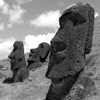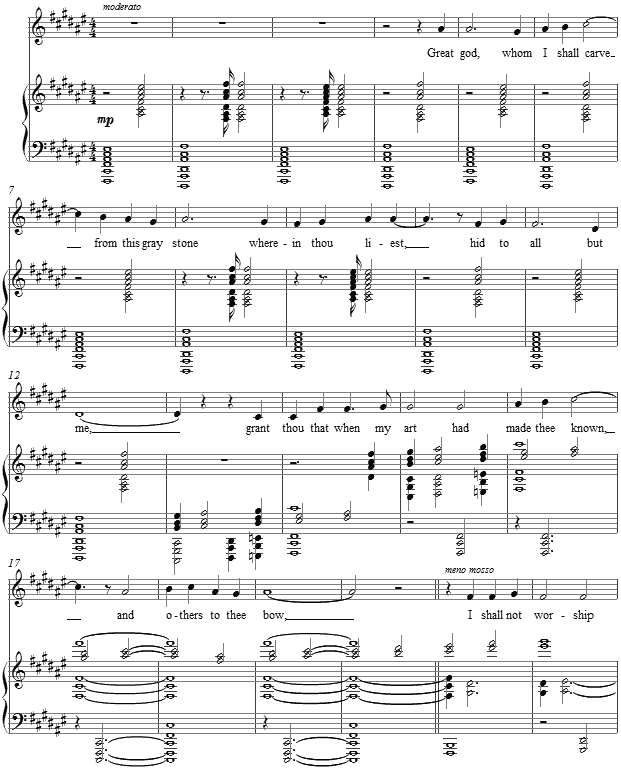Music and Texts of GARY BACHLUND
Vocal Music | Piano | Organ | Chamber Music | Orchestral | Articles and Commentary | Poems and Stories | Miscellany | FAQs
The Idol-Maker Prays - (2008)
Arthur Guiterman
for high voice and piano
Great god whom I shall carve from this gray stone
Wherein thou liest, hid to all but me,
Grant thou that when my art hath made thee known
And others bow, I shall not worship thee.
But, as I pray thee now, then let me pray
Some greater god,—like thee to be conceived
Within my soul,—for strength to turn away
From his new altar, when, that task achieved,
He, too, stands manifest. Yea, let me yearn
From dream to grander dream! Let me not rest
Content at any goal! Still bid me spurn
Each transient triumph on the Eternal Quest,
Abjuring godlings whom my hand hath made
For Deity, revealed, but unportrayed![ 4 pages, circa 3' 25" ]
The Idols of Easter Island
Arthur Guiterman's reputation lies with humorous verse, such as Strictly Germ-Proof; the page with a song setting for that comic text contains additional information about this author and poet.
Here Guiterman turns his attention to the more serious discussion in rhymed verse of the nature of God, as the idol maker speaks to the god whose likeness he invents, with full yet growing awareness and sophistication that each mystery of God probed brings yet another mystery. This notion is caught up in a fine explanation for the tripartite repetition of "Holy, Holy, Holy" stemming from the Latin mass' "Sanctus, Sanctus, Sanctus" which in turn is drawn from the threefold repetition in the word for holiness as found in the original Hebrew text, "Kadosh, Kadosh, Kadosh." Why the repetition? One commentator sensibly suggested that holiness in this meaning is such a mysterious concept that "looking behind the curtain" yields another curtain behind which to look, which in turn yields another.
In an amusingly similar way, Stephen Pincker's imaginative text, How the Mind Works, ends with an intellectual shrug basically concluding that there are mysteries of the mind which the mind perhaps will never be able to solve. In the same way the modern eruptions of enthusiastic atheism yield the same old nostrums, while pretending towards some new insights. There is that which cannot be portrayed, even in the clumsy credo of a non-believer, but rather as Guiterman reminds us will remain "unportrayed," for who shall claim full comprehension and knowledge of God?
Conceived for high voice, the pendulum between tonic and submediant seven chords carries the opening exposition through to a rising gesture and cadence in three arching repetitions. As the statement of revelation is reached the key of F sharp major yields to E flat major alongside the text's notion that there is this very human "Eternal Quest," which Guiterman spells with capital letters all the while spelling "god" and the plenteous and more diminutive "godlings" in the lower case. As with Darwin's "the Creator," this is a statement without expression of a particular religious faith, and yet one which abounds with faith -- the idol maker's most sensible conclusion, mirroring that acknowledgment in our time as organizations such as Alcoholics Anonymous also recognizes, "a higher power." The piano accompaniment should be sonorous, long lined and sustained.
The score for The Idol-Maker Prays is available as a free PDF download, though any major commercial performance or recording of the work is prohibited without prior arrangement with the composer. Click on the graphic below for this piano-vocal score.

